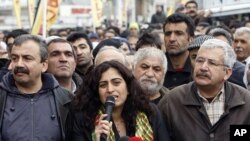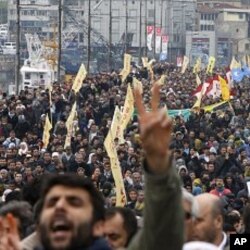Turkey's top election board is reconsidering a decision to ban 12 independent candidates from running in this June's general election. All the banned candidates are supported by the pro-Kurdish Peace and Democracy Party (BDP) and the decision to ban them set off violent protests all over the country.
Turkey's High Election Board says it will review its earlier decision to ban 12 independent candidates, supported by the pro-Kurdish Peace and Democracy Party, from running in the June 12 general election. They registered as independents to circumvent the legal requirement that a party needs 10 percent of the vote for parliamentary representation. The 10 percent barrier is widely considered a means of preventing Kurdish representation. Many protesters see the ban as another anti-democratic step against Kurds.
One pro-Kurdish demonstrator in Istanbul says the basic right of electing and being elected has been taken away from them and the ban is preventing their candidates from entering the parliament.
Turkey's electoral board had banned the Kurdish-backed candidates citing their criminal records. All have been convicted under the country's anti-terror laws.
But two of the banned candidates have already held political office, including Sabahat Tuncel who says the ban is politically motivated. She says the ban is being perceived as an attempt to exclude Kurds from the democratic process, that is why there is such a reaction.
The ban comes at the same time the BDP is facing legal crackdowns with nearly 2,000 party members currently detained accused of supporting the PKK.
Richard Howitt the spokesman on Turkish affairs for the Alliance of Socialists and Democrats in the European Parliament, says there will be consequences for Turkey's bid for membership in the European Union.
"Well this decision comes in the wake of past decisions to ban the precursor party of the BDP and follows a long line of interventions of the ability of people and parties to stand freely in elections in Turkey," he said. "And I will need a lot persuasion that this in line with our European values of free and democratic expression and choice. And there is no doubt that, that will form part of the judgment we make this year on whether Turkey is making progress towards the European Union or not. "
But with Turkey's EU bid stalled due to strong opposition from some members, such threats carry little weight with the government.
The minister of Interior Besir Atlay supported the ban while Prime Minister Recep Tayyip Erdogan, in search of nationalist votes in this June's election, accused the BDP of being responsible for creating discord in the country. He said there is no Kurdish issue in Turkey anymore, the exploitation of Kurdish siblings in Turkey is the issue.
That speech is seen as the Prime Minister stepping back from his previous stance of acknowledging the country's Kurdish population have legitimate grievances saying in 2007 that Turkey has a Kurdish problem.
Political scientist Cengiz Aktar of Bahcesehir University says the ban is part of a worrying new trend, but praises the restraint of Kurdish politicians.
"The message is clear go back to the mountains and continue the fight," Aktar said. "But the Kurdish politicians are teaching a democracy lesson to the entire Turkey, because they could have said we withdraw from the Turkish political life, and its already an extremely good news. But if their requests and argument does not go through. Well we may have tremendous problems in this country. "
A pro-Kurdish newspaper headline described the ban as a declaration of war. Such fears fuel growing condemnation with the main opposition calling for immediate recall of parliament, while the speaker of parliament too has added his voice to the growing condemnation. Pressure has been growing on the electoral board to reverse its decision and the board will now talk things over. Observers warn Turkey could well be at the crossroads, peace or conflict.





